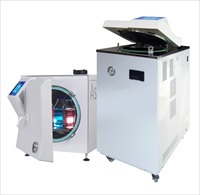Channels
Special Offers & Promotions
No Drain? No Problem!
If you are looking for a new autoclave, some manufacturers will tell you that it is essential to have a drain, a compressor and a suitable power supply.
 This is a common situation when looking to purchase a small autoclave for laboratory use - but how practical is it to locate your autoclave near a drain? Often autoclaves are benchtop mounted, or the preferred location (from an ergonomic perspective) is an area where no such facilities exist. For many autoclaves the solution can be far from practical: the building infrastructure may need alteration, or alternatively the autoclave ends up being positioned in a room that has the necessary drainage requirements, but is far from ideal.
This is a common situation when looking to purchase a small autoclave for laboratory use - but how practical is it to locate your autoclave near a drain? Often autoclaves are benchtop mounted, or the preferred location (from an ergonomic perspective) is an area where no such facilities exist. For many autoclaves the solution can be far from practical: the building infrastructure may need alteration, or alternatively the autoclave ends up being positioned in a room that has the necessary drainage requirements, but is far from ideal.
In addition, small autoclaves that require compressors in order to operate have a greater number of integral serviceable components; inevitably this means that component failure is more likely, the end-result being downtime that a busy laboratory can ill-afford.
Astell Scientific, the longest established autoclave manufacturer in the UK, offer a solution to the above issues – and it’s a simple one. The Compact “Autofill” models (available in 33, 43 and 63 litre capacities) are totally self-contained autoclaves that have no requirement for drainage, and do not need a compressor to operate. How is this achieved? Well, the Compact “Autofill” range has been designed with one purpose in mind – to provide the simplest autoclaving solution for the typical microbiology laboratory.
When designing this versatile range, Astell began by making optimal use of the space available inside the autoclave frame, fitting an internal tank that acts as both a water reservoir and a condensate collection vessel. The controller software was then adapted to automatically fill and drain the chamber at the beginning and end of the cycle – meaning that no water ever needs to leave the autoclave during operation. Any residual steam during the air-removal (free steaming) stage passes through a condenser and back into the integral water reservoir – meaning that no water is unnecessarily wasted. This clever design ensures that any loss of water (e.g. through free steaming, evaporation etc.) is minimal and extremely gradual, meaning that the water in the tank only needs to be replenished occasionally.
Further innovations, such as the angled chamber design (which reduces the water level required for operation) combined with the fact that the hot water is completely removed from the chamber following the sterilization process, reduce heat-up and cooling times. Additionally, the faster cycles and the water-saving features inevitably ensure that this range has excellent ‘green’ credentials.
Finally, following sterilization, these models feature an innovative pulsed heat drying system which is suitable for non-porous loads such as laboratory glassware and plastics.
Astell pride themselves on the fact that they listen to their customers, and consequently design and refine their products to ensure ease of use. Moreover, the flexibility and adaptability for which Astell is renowned ensures that users’ needs are met, and that practical solutions are provided to ensure maximum efficiency in the modern laboratory.
Media Partners


